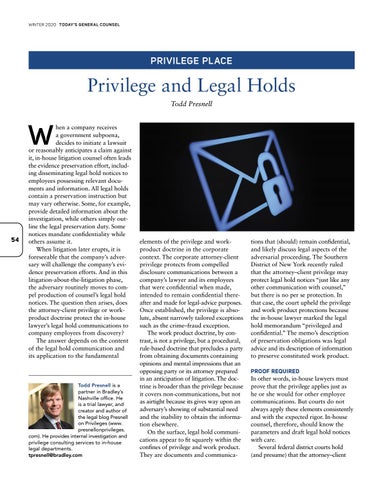WINTER 202 0 TODAY’S GENER AL COUNSEL
PRIVILEGE PLACE
Privilege and Legal Holds Todd Presnell
W
54
hen a company receives a government subpoena, decides to initiate a lawsuit or reasonably anticipates a claim against it, in-house litigation counsel often leads the evidence preservation effort, including disseminating legal hold notices to employees possessing relevant documents and information. All legal holds contain a preservation instruction but may vary otherwise. Some, for example, provide detailed information about the investigation, while others simply outline the legal preservation duty. Some notices mandate confidentiality while others assume it. When litigation later erupts, it is foreseeable that the company’s adversary will challenge the company’s evidence preservation efforts. And in this litigation-about-the-litigation phase, the adversary routinely moves to compel production of counsel’s legal hold notices. The question then arises, does the attorney-client privilege or workproduct doctrine protect the in-house lawyer’s legal hold communications to company employees from discovery? The answer depends on the content of the legal hold communication and its application to the fundamental
Todd Presnell is a partner in Bradley’s Nashville office. He is a trial lawyer, and creator and author of the legal blog Presnell on Privileges (www. presnellonprivileges. com). He provides internal investigation and privilege consulting services to in-house legal departments. tpresnell@bradley.com
elements of the privilege and workproduct doctrine in the corporate context. The corporate attorney-client privilege protects from compelled disclosure communications between a company’s lawyer and its employees that were confidential when made, intended to remain confidential thereafter and made for legal-advice purposes. Once established, the privilege is absolute, absent narrowly tailored exceptions such as the crime–fraud exception. The work product doctrine, by contrast, is not a privilege, but a procedural, rule-based doctrine that precludes a party from obtaining documents containing opinions and mental impressions that an opposing party or its attorney prepared in an anticipation of litigation. The doctrine is broader than the privilege because it covers non-communications, but not as airtight because its gives way upon an adversary’s showing of substantial need and the inability to obtain the information elsewhere. On the surface, legal hold communications appear to fit squarely within the confines of privilege and work product. They are documents and communica-
tions that (should) remain confidential, and likely discuss legal aspects of the adversarial proceeding. The Southern District of New York recently ruled that the attorney–client privilege may protect legal hold notices “just like any other communication with counsel,” but there is no per se protection. In that case, the court upheld the privilege and work product protections because the in-house lawyer marked the legal hold memorandum “privileged and confidential.” The memo’s description of preservation obligations was legal advice and its description of information to preserve constituted work product. PROOF REQUIRED
In other words, in-house lawyers must prove that the privilege applies just as he or she would for other employee communications. But courts do not always apply these elements consistently and with the expected rigor. In-house counsel, therefore, should know the parameters and draft legal hold notices with care. Several federal district courts hold (and presume) that the attorney–client
